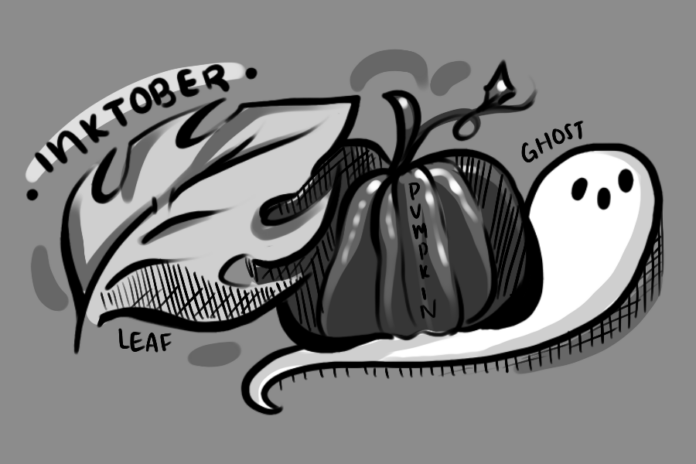Inktober: a month-long drawing challenge for the struggling artist
By MAYA KORNYEYEVA — mkornyeyeva@ucdavis.edu
Ah, the universally feared art block. It creeps up on the best of us, looming over even the most proficient artists and slowly draining away any and all creative ideas. Art block is stubborn and not easily deterred — extending its stay for days, weeks, months and, in some of the worst cases, for years.
In the darkest moment (two weeks into fall quarter), October rolls around, and with it arrives a knight in shining armor, ready to take a stand against art block. You may have guessed it: the hero of this story is none other than Inktober.
Inktober is a yearly tradition for many artists, founded by American illustrator Jake Parker in 2009. Each October, a brand new set of 31 words is posted to the Inktober website, featuring prompts from “grungy” to “scarecrow” (2024). The goal is to take each word and create one drawing per day, whether it’s a tiny doodle, a 20-minute sketch or a full piece.
Many artists, like myself, prefer a specific medium or muse (focusing only on a single genre or style of art), and Inktober’s diverse list of prompts directs artists out of their comfort zone and to tune in to their imagination in a novel way. While Inktober, as per the name, signals ink or pen as the medium of choice, the daily prompts are truly up for interpretation. Many recent entries are digital rather than traditional, and artists use everything from paint to charcoal to pencil to create their drawings.
In this way, Inktober functions as a challenge for artists to consistently practice their skills while encouraging them to think outside the box. The limit is your imagination — there is no “one right answer” when it comes to Inktober.
Inktober is also perfectly curated for fans of the spooky side of October, those who adore sketching ghouls, fantastical creatures and creepy little goblins. It’s a Halloween lover’s paradise, but the prompt ambiguity also works to make it easily accessible and enjoyable by artists from all backgrounds and creative passions.
For instance, one artist may take the prompt “Gargoyle” (2022) and interpret the word as the typical frightening stone creature, drawing from the lens of horror and mystery. Another artist from a different background (for instance, architecture) may illustrate the gargoyle from a mathematical, sculptural point of view. A third artist in the fashion industry could take a different approach entirely, creating a costume design that emulates “gargoyle” elements by sampling gray colors, stone textures and carved patterns.
With all this being said, no art challenge is entirely devoid of controversy. Parker recently faced severe backlash from the artist community. In a bid to protect his intellectual property, Parker copyrighted the “Inktober” challenge in 2019, urging artists to refrain from using the logo and only including the term “Inktober” as a subtitle. A year later, in 2020, Parker became the center of yet another scandal, this time concerning his alleged plagiarism of Alphonso Dunn’s instructional art book. While Parker denied plagiarizing, artists worldwide took a step back from Inktober and its controversial founder.
Despite Inktober’s loss in popularity, the original spirit of the challenge is still present and very much alive. Since 2020, each October has been widely celebrated as a month of diligent art practice, with influential artists developing their own themed prompts and posting them on social media for their followers to explore. These new themes include “Witchtober,” “Drawtober” and “SpookTober” (to name a few), and they all function in a very similar fashion to Inktober.
If you, like me, are fighting a losing battle against art block, don’t fear: all you need is to equip yourself with an arsenal of art challenges to practice with. You can take your prompts from Inktober, or choose any other themed list that sparks your creativity. Needless to say, you don’t have to be “good” at art — just the act of developing a casual sketching routine can help you alleviate stress and feel refreshed after a day of exhausting classes. If you’re reading this in print, feel free to take your copy of The California Aggie and cover it in spooky doodles.
Written by: Maya Kornyeyeva — mkornyeyeva@ucdavis.edu
Disclaimer: The views and opinions expressed by individual columnists belong to the columnists alone and do not necessarily indicate the views and opinions held by The California Aggie.









